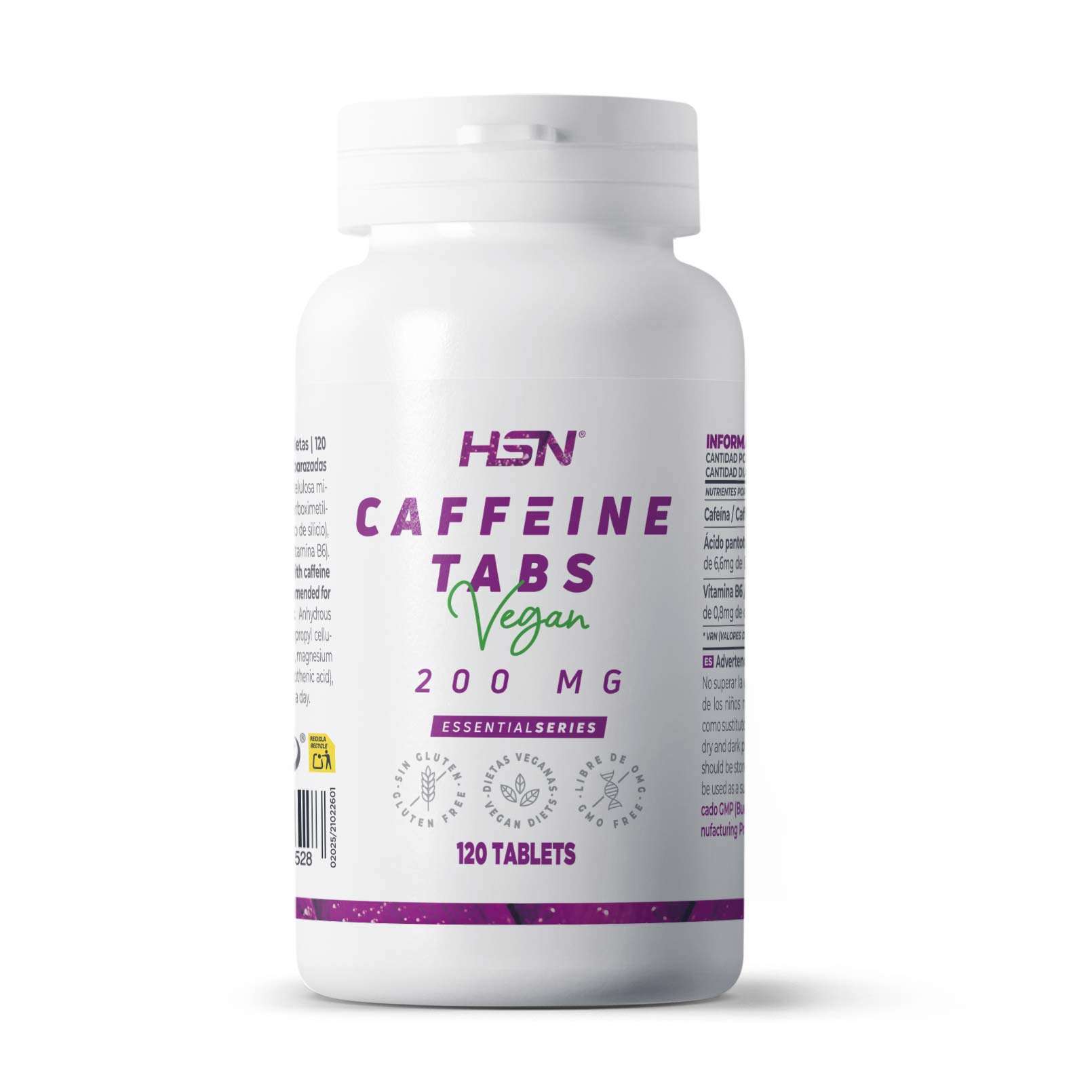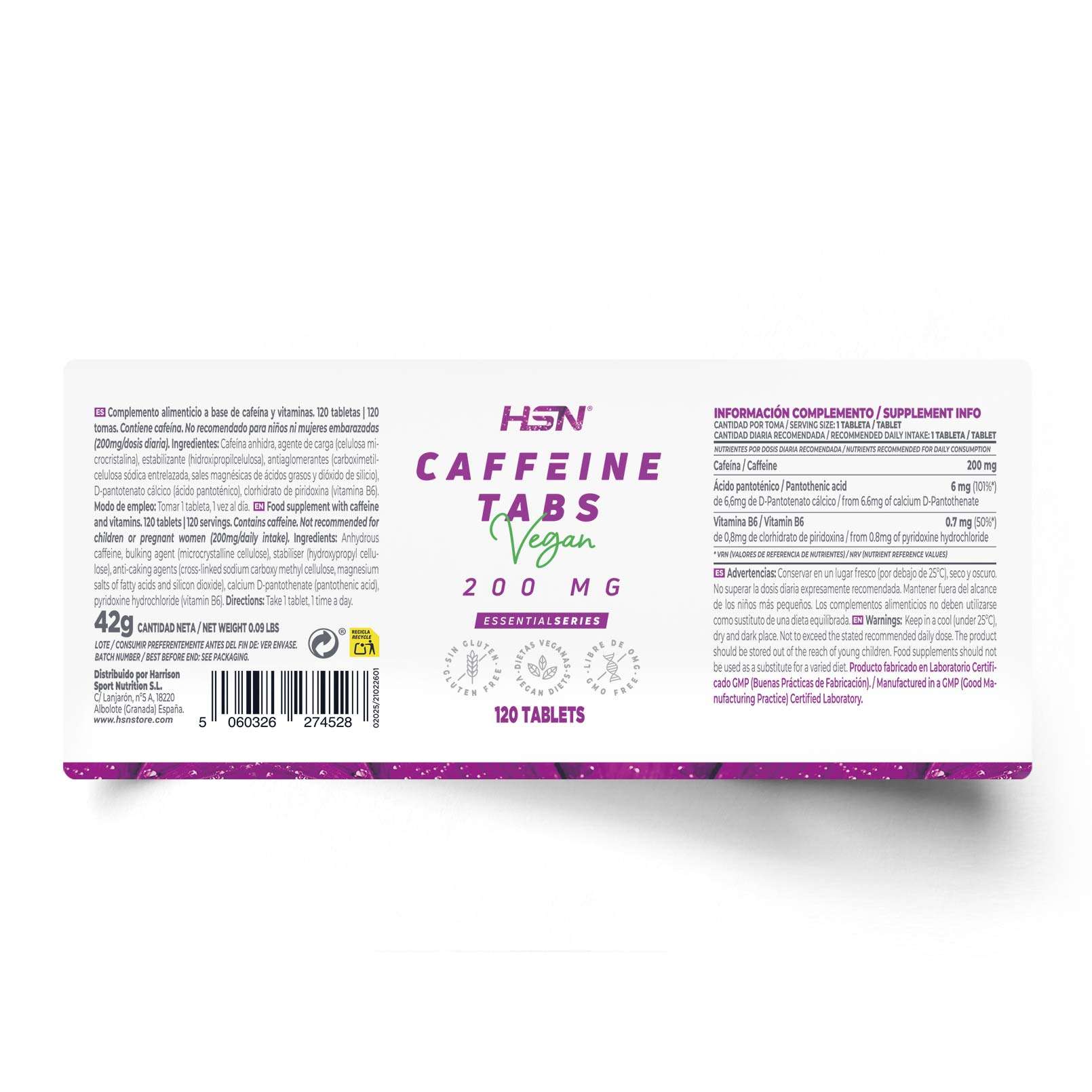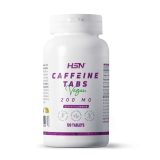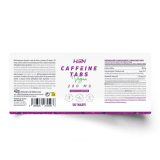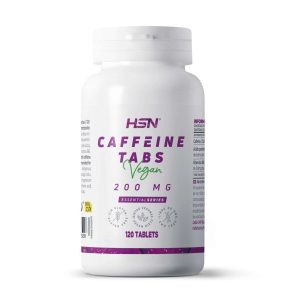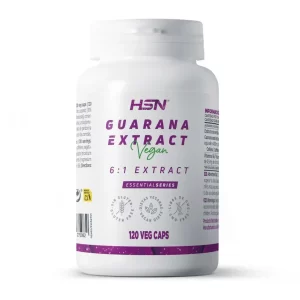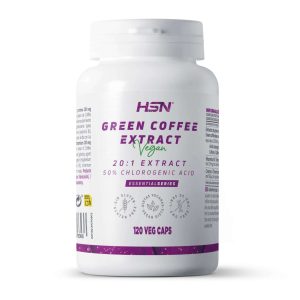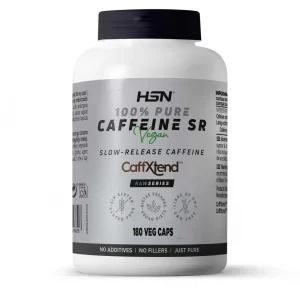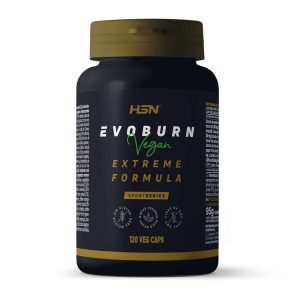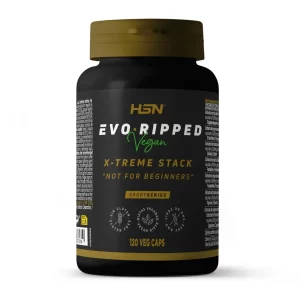- Anhydrous caffeine tablets with high concentration: 200mg per tablet.
- Caffeine from synthetic origin – 100% pure. Completely safe. Same properties as natural caffeine.
- In uncoated tablets for rapid dispersion and quick kick-in with no delay.
- Includes a significant amount of vitamins B5 and B6 to support cognitive performance and reduce tiredness and fatigue.
- Fast-acting – Ideal for athletes before training and students before study sessions.
- 200mg (1 tablet) is roughly equivalent to 2.5 cups of coffee or 600ml of energy drink.New study featuring HSN caffeine!
Scientists from the Universities of Seville and Alcalá have chosen HSN caffeine as the reference for maximum purity and quality for their research. You can read more about the study here.
Caffeine Tablets – A Classic Within Reach
Caffeine 200mg by EssentialSeries is a food supplement in tablet form, made from synthetic caffeine as the main ingredient, combined with two B-group vitamins (B5 and B6) in highly bioavailable forms.
Caffeine can be found in many common foods in diets worldwide. Taking caffeine in tablet form is a more convenient way to consume an effective dose of this alkaloid and benefit from its functional effects. Moreover, this format allows you to avoid the distinctive taste of caffeine’s primary food source: coffee, for those who don’t enjoy it.
HSN Caffeine 200mg is made in small, fast-release tablets for more effective use without taste.
High Potency Dose – Effectiveness and Safety
200mg per Tablet – Why This Dose?
When determining a caffeine dose in a pre-dosed format, like tablets, it’s important to choose the right dosage since it greatly influences compatibility with individuals’ sensitivities and the number of units needed.
In our case, we have always been clear: 200mg of pure caffeine is the ideal dose.
Considering that the minimum effective dose to notice significant effects on focus is 75mg, and that the ergogenic dose of caffeine is around 3mg/kg of body weight (210mg for 70kg); 200mg is the perfect average dose to fully harness caffeine’s benefits regardless of the objective or individual sensitivity.
Uncoated Tablets – Rapid Dispersion
Uncoated tablets offer several key advantages from a functional and consumer perspective.
Firstly, these tablets provide faster caffeine release in the body as they don’t require the additional time needed to dissolve a coating. This can be particularly beneficial for those seeking quick effects, such as a rapid increase in mental alertness or immediate preparation for sports activities.
Moreover, since uncoated tablets are essentially compressed caffeine with very few agents aiding compression and stability, the purity of the formulation is a significant advantage for users concerned about unnecessary additives.
HSN’s uncoated caffeine tablets offer a practical, simple, and convenient way to use high-concentration caffeine.
Small Tablets for Easy Consumption
Tablets that are free from excess additives can be developed in smaller sizes, as we have done with HSN caffeine. This provides a significant advantage in terms of convenience and ease of use.
For many consumers, particularly those who find it difficult to swallow large pills, smaller tablets are much more manageable and user-friendly. This is especially relevant for caffeine users, as it can appeal to a wide range of people, from those seeking a pre-study or pre-workout boost, who may not be accustomed to taking large capsules or tablets, to those who only use caffeine as a supplement.
Another important advantage of their small size is portability. Users can easily carry caffeine with them, whether at work, school, or during physical exercise. This portability allows for quick and easy access to caffeine, which is especially useful for those with specific intake times who are not at home when needed.
In summary, the small tablet format was intentionally developed to offer a more practical and convenient way to use caffeine.
Why Add Vitamins?
We have included two key vitamins in our caffeine formula:
Both micronutrients are part of the B group of water-soluble vitamins, versatile, convenient, and easy to use, and they have been included in the caffeine tablets for their synergistic properties with this alkaloid:
- Pantothenic acid (B5) contributes to normal mental performance.
- Vitamin B6 helps reduce tiredness and fatigue.
Synthetic vs Natural Caffeine – Which to Choose?
Synthetic and natural caffeine are chemically identical. Both forms of caffeine share the same molecular structure, C8H10N4O2, meaning that regardless of origin, they behave the same way in the human body. The potency of caffeine is not affected by whether it comes from a natural source, such as coffee or tea, or is synthetically produced in a laboratory. Both forms of caffeine are metabolised by the body in the same way, producing identical effects at the same level.
The choice between synthetic and natural caffeine is therefore a matter of personal preference and context. Some people prefer natural caffeine because they associate it with coffee, while others may opt for synthetic caffeine due to its convenience and often lower cost.
In summary, the decision between the two depends on personal preferences, not differences in caffeine effectiveness.
If you prefer natural caffeine, you can find it in HSN’s vegetable capsules: Natural Caffeine 200mg in Capsules.
Tablets vs Capsules – Which is Best for Me?
Caffeine tablets and capsules mainly differ in their form, composition, and dissolution time.
Tablets can, when coated, have a slightly slower dissolution and absorption in the body compared to capsules. However, when they are not coated, like HSN caffeine tablets, their disintegration and absorption are often faster than in capsule form.
Nevertheless, caffeine absorption in the stomach is very similar between both formats, and any noticeable difference depends on the specific product formulation, making it difficult to compare across brands or different galenic compositions.
The choice between tablets and capsules depends on individual preferences and specific goals. Some people may find one form easier to swallow than the other, which will be the primary factor influencing your choice. In any case, both formats effectively deliver the benefits of caffeine and have the same properties when dosed equally.
The decision depends on personal comfort and convenience.
And Powder?
Caffeine tablets offer significant advantages in terms of portability and precise dosing. Being compressed into a solid and stable form, tablets are easy to carry anywhere, whether in a bag, backpack, or even a pocket. This portability makes them ideal for those who need a quick and convenient caffeine dose while on the go. Additionally, tablets provide precise dosing, with each one containing 200mg, eliminating the need for measuring and ensuring consistent intake every time. This precision is crucial for those who want to carefully monitor their caffeine consumption to avoid adverse effects from excess intake.
On the other hand, caffeine powder offers unmatched flexibility for mixing with other compounds in custom formulations that can be prepared in combination with other ‘RAW’ food supplements.
Caffeine powder is ideal for more experienced users who create their own pre-workout mixes at home, as it can be easily measured and adjusted to achieve the exact dose needed in each case.
Generally, pre-dosed caffeine formats (tablets or capsules) are recommended for those unfamiliar with its use or who are looking for a convenient way to take caffeine anytime, anywhere.
Caffeine powder, on the other hand, is the preferred option for those who only use caffeine at home and typically mix it with other powdered supplements to prepare custom blends based on their needs.
How Much Is 200mg? Comparison with Common Foods
The caffeine content in foods is highly variable, depending on cultivation methods (for coffee and tea), brand, and preparation. However, some references for the amount that 200mg equals, as provided by an HSN tablet, are:
- Between 2 and 3 average-sized cups of coffee, made in an Italian coffee maker.
- About 3 large cups of black tea.
- Over 2 litres of traditional cola beverages.
- Just over one large can (500ml) of energy drink.
- 3 tablespoons of instant coffee.
As you can see, caffeine in tablets is much more practical than many of these options, as it allows you to avoid taste, sugar, and any other elements that accompany these foods.
Caffeine Properties You Might Find Interesting
Caffeine is widely used, especially by athletes and students, as this alkaloid, consumed under specific circumstances, has beneficial effects on academic and athletic performance.
To improve concentration and alertness, you need at least 75mg, which is why caffeine is so commonly used among students.
For enhanced endurance, athletes take doses of 3mg/kg of body weight, one hour before exercise.
Caffeine is one of the most scientifically studied supplements, with some of the strongest research-backed properties, almost on par with creatine monohydrate, and is considered an essential part of a pre-workout stimulant combo or a nootropic formula for students.
FAQ
If I’m Sensitive to Caffeine, Can I Take This Product?
It depends on your sensitivity, but probably not.
If you react negatively to a cup of coffee, possibly due to poor caffeine metabolism, the 200mg caffeine dose in this product may be too high for you.
Up to What Time in the Afternoon Can I Take Caffeine?
It’s generally recommended to take caffeine no later than 6 hours before bedtime to avoid affecting sleep, although this varies significantly depending on individual sensitivity. Some people can take caffeine before late evening workouts and sleep without any issues.
Do I Need to Take Caffeine Tablets with Food?
No, it’s not necessary, but the stimulating effect may be more noticeable on an empty stomach.
What Should I Combine with Caffeine Before Training?
The best products to combine are:
- Beta-Alanine.
- Citrulline Malate.
- Creatine Monohydrate.
- Nitrates (or nitrate-rich sources like beetroot).
- Electrolytes.
What Should I Combine with Caffeine Before Studying?
You can combine it with:
- Phosphatidylserine.
- L-Theanine.
- DMAE.
- Citicoline.
Scientific References
- Szumiło, M., Świąder, K., Belniak, P., Wojciechowska, J., & Poleszak, E. (2015). The influence of excipients on physical properties of tablets and dissolution of caffeine. Acta Poloniae Pharmaceutica – Drug Research, 72(4), 791–797.
- Grgic, J., Grgic, I., Pickering, C., Schoenfeld, B. J., Bishop, D. J., & Pedisic, Z. (2019). Wake up and smell the coffee: Caffeine supplementation and exercise performance – An umbrella review of 21 published meta-analyses. British Journal of Sports Medicine.
- Perera, V., Gross, A. S., & McLachlan, A. J. (2012). Measurement of CYP1A2 activity: a focus on caffeine as a probe. Current Drug Metabolism, 13(5), 667–678.
- Drake, C., Roehrs, T., Shambroom, J., & Roth, T. (2013). Caffeine effects on sleep taken 0, 3, or 6 hours before going to bed. Journal of Clinical Sleep Medicine: Official Publication of the American Academy of Sleep Medicine, 9(11), 1195–1200.
- Cappelletti, S., Daria, P., Sani, G., & Aromatario, M. (2014). Caffeine: Cognitive and Physical Performance Enhancer or Psychoactive Drug? Current Neuropharmacology, 13(1), 71–88.
- Fisone, G., Borgkvist, A., & Usiello, A. (2004). Caffeine as a psychomotor stimulant: Mechanism of action. Cellular and Molecular Life Sciences, 61(7–8), 857–872.

